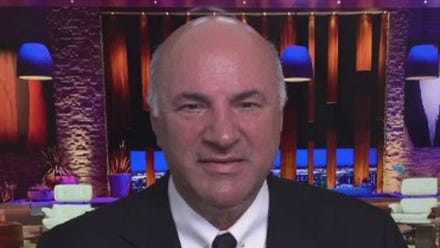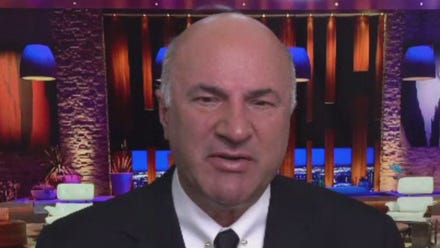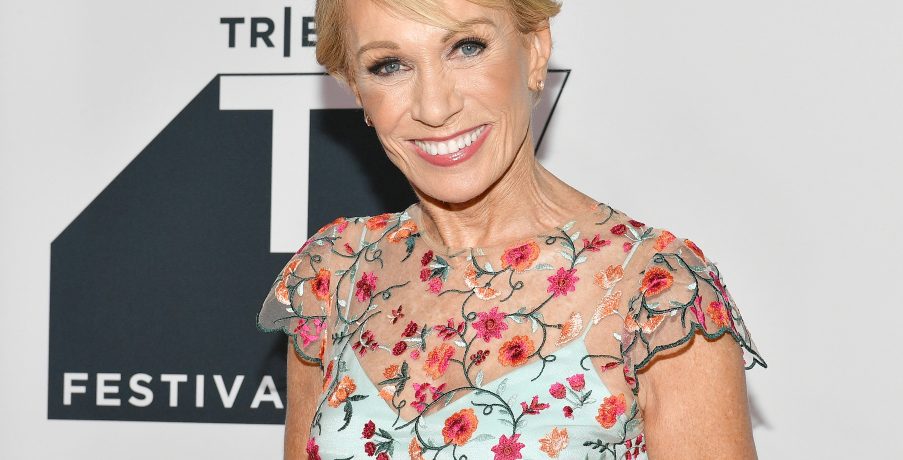
-
Mr. Wonderful’s 3 Steps for Growing Your Business Again
In Best Of, Entertainment, Featured, Guest, Interview, Latest, News Stories, Technology, The World, videosPost Views: 685By Joe Connolly and Neil A. Carousso
NEW YORK (WCBS 880) — “Shark Tank” investor Kevin O’Leary stressed business owners need to adapt to what he believes are permanent changes to consumer behavior as a result of the COVID-19 pandemic.
On the WCBS Virtual Business Breakfast, presented by The First National Bank of Long Island, the self-made multi-millionaire entrepreneur made several recommendations of digital tools, sharing actionable advice for business recovery with host Joe Connolly. Mr. Wonderful also revealed what some of his companies have found success doing despite the economic turmoil.
1. MAKE THE “GREAT DIGITAL PIVOT”
.@kevinolearytv says 36/56 companies he had invested in have stayed in business because they embarked on the “great digital pivot.”
— WCBS 880 (@wcbs880) March 29, 2021
See Mr. Wonderful’s steps for growing your business again here: https://t.co/Z6pbg5WJqN#WCBSBizBreakfast #FNBLI @JoeConnollybiz @NeilACarousso pic.twitter.com/Xljxm2tAY0O’Leary divulged that only 36 of the 56 companies he had been invested in across “almost every sector” nationwide are still in business a year into the pandemic.
“They did the great digital pivot and that involves figuring out how to set up a platform – most of them use Shopify not Amazon, number one – to change their websites to be far more interesting and engaging,” he told Connolly.
Shopify allows businesses to create their own e-commerce website using the platform whereas Amazon is the consumer-facing website for companies’ online marketplace.
“They went to 4K photography, 1080p video, they told stories about their products, they had other customers talk about testimonials and how they were using them, so they really engaged people for the first time in ways they’ve never done before because they were forced to – everybody was working remotely,” O’Leary said.
He also shared the trick to monetizing digital content on the WCBS Virtual Business Breakfast. More on that later in Mr. Wonderful’s 3rd step to growing again.
2. PUT YOUR CUSTOMER FIRST
.@ABCSharkTank star @kevinolearytv tells @JoeConnollybiz the best way to sell is to promise customer support and deliver on it. #WCBSBizBreakfast #FNBLI
— WCBS 880 (@wcbs880) April 1, 2021
See Mr. Wonderful’s actionable steps for growing your business here: https://t.co/AtQ2BXZyH3 pic.twitter.com/x4BRNBPcr0O’Leary said the best way to sell is to “promise customer support and deliver on it.”
He told Connolly his frequent advice to young entrepreneurs is that the customer is always number one, and if you treat them like that, you can have a very profitable business.
“The differentiating factor in selling is customer service,” O’Leary said, adding, “You can actually sell the same product for a higher price if you’re in the top quartile of customer service for it.”
The software tycoon invoked Apple as a prime example.
“When you buy a laptop from them, you’re paying 50 percent more than the exact same machine’s function on a Windows-based product or a brand you may not know, but because Apple makes you pay for customer support and you respect it and you want it, you pay a crazy amount more,” he said.
3. REDUCE YOUR CUSTOMER ACQUISITION COSTS
.@NeilACarousso asked @kevinolearytv this question from WCBS 880 listeners. #WCBSBizBreakfast #FNBLI
— WCBS 880 (@wcbs880) April 3, 2021
See more tips for business growth from @ABCSharkTank’s Mr. Wonderful and @JoeConnollybiz here: https://t.co/SAFbziOdnM pic.twitter.com/w4wh9S5tYiWCBS Business Producer Neil A. Carousso posed the number one question WCBS 880 listeners had for O’Leary, which was “How do you monetize digital content?”
Mr. Wonderful responded the only metric for monetizing digital content is whether it can reduce customer acquisition costs for one’s product or service.
“Basically, what you’re trying to do when you make new digital content is to tell a story about your product, show it in its best light, try and get testimonials from other users who are using it and why they use it, and try and acquire customers at the lowest cost you can,” the Shark explained.
“Remember, long-term outcome is basically customer acquisition costs have to be less than lifetime value of the customer acquired. Otherwise, you go out of business,” O’Leary added.
He produces a plethora of content for the companies he’s invested in and shows behind-the-scenes of commercial shoots, media appearances, and his daily life on his YouTube channel, which includes afternoon bike rides along Miami Beach, playing the guitar, cooking in his “Chef Wonderful” videos and enjoying O’Leary Fine Wines with his wife Linda.
A bonus step for growing your business again, O’Leary acknowledges, is a healthy work-life balance.
“I don’t work 9 to 5, obviously, and I try and find life balance in doing the things I love to do while I’m working,” said Mr. Wonderful. “I work seven days a week, but I don’t work every hour.”
-
WCBS Virtual Business Breakfast: ‘Shark Tank’ Star Kevin O’Leary Boasts of ‘Digital 2.0 America’ in Growing Out of Pandemic
In Best Of, Entertainment, Featured, Guest, Interview, Latest, News Stories, Technology, The World, Top News, videosPost Views: 697By Joe Connolly and Neil A. Carousso
NEW YORK (WCBS 880) — Kevin O’Leary, the self-made entrepreneur turned TV “Shark,” brought his straight-shooting, no-frills flare to the WCBS Virtual Business Breakfast with Joe Connolly, presented by The First National Bank of Long Island, in sharing how to grow one’s business again.
O’Leary, who was nicknamed “Mr. Wonderful” by co-star Barbara Corcoran in season one of ABC’s hit show “Shark Tank,” praised business owners for their grit and resilience during the unprecedented coronavirus pandemic that has levied a burden on the economy over the past year and shut down major industries, namely restaurants and hospitality companies.
“The great thing about the American entrepreneur is they don’t let failure stop them,” he said. “The majority of them try again and learn from their mistakes.”
O’Leary emphasized a changed economy, telling Connolly owners must pursue a digital “transformation” to survive the pandemic.
“You’ve got to realize that you have to do a digital pivot,” he explained.
Mr. Wonderful said only 36 of the 56 companies he had been invested in are still in business a year into the pandemic, noting many of his still-standing “Shark Tank’ companies shifted to using Shopify for their e-commerce platform and incorporated high-quality photography and video to connect and find new customers.
“They really engaged people for the first time in ways they’ve never done before because they were forced to – everybody was working remotely,” said O’Leary.
“Retail is really challenged because if you’re just (in a) 1,200 square-foot space in a mall and the traffic’s dropped 20 percent, I don’t think that’s going to work out for anybody because consumer preferences have dramatically changed in the last year towards online retail,” he noted.
He suggested direct-to-consumer sales will help businesses to cut and manage costs, grow their gross margins, and build for the future.
O’Leary does not anticipate remote work habits will be broken. He’s actually betting on it to stay by shrinking his real estate portfolio from 31 percent to 8 percent over the next three years while the market adjusts to the post-pandemic economy.
“I haven’t had a cold or been sick since March 7th of last year and I’m starting to like it,” he said, adding, “I don’t think I’m getting in an elevator in New York going up to the 78th floor with 60 people ever again – not in December. I’m not going into a packed restaurant. That may just be me; I’m a germaphobe, but I’ve talked to lots of other people that have the same concerns.”
Kathy Wylde, president and chief executive officer of the Partnership for New York City, cited the “burnout” some employees feel by working from home where many feel they are always at work. She believes employers and employees want to return when it’s safe to do so. Mr. Wonderful disagrees with her assessment.
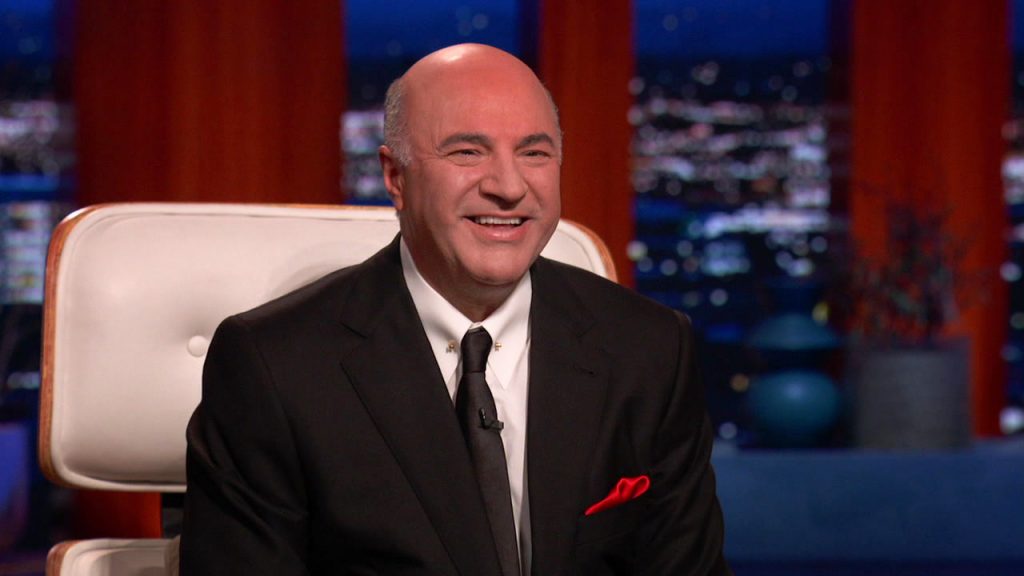
Photo Credit: ABC. “They have no interest in coming back to headquarters – not now, not ever,” O’Leary said of his workers. “In fact, if you try and force them, they’re going to find a job somewhere else where they get that flexibility.”
The O’Leary Financial Group founder told the WCBS Virtual Business Breakfast that he hears most of his 10,000 employees enjoy working from home to take care of children and elderly parents while avoiding rough commutes in major metropolitan cities like New York.
Employers in professional services find productivity is up and they have a widened talent pool across the country and world.
The “Shark Tank” investor said he has made informed business decisions by listening to others he encounters while working remotely, himself, from his Miami Beach dream house where he joined Connolly virtually from his home studio.
One example of this is when he struck up a conversation with the nurse who administered his first dose of the COVID-19 vaccine recently. She explained that at 24 years old she was uncomfortable with the lack of data around the vaccine and fertility.
“I had obviously heard of anti-vaxxers before, but I always thought they were the lunatic fringe – the 10 percent that thought the government was injecting them with a chip or something,” O’Leary said.
“I’m under the impression now, or at least in terms of my investment philosophy, that we’re going to get to a place pretty soon in the next 6 weeks, maybe 8 weeks, where we will have vaccinated two-thirds of the country and we’re going to hit a brick wall. The other third isn’t going to take it,” he believes, thus he’s downsizing his physical footprint, beefing investment in the digital space, and encouraging restaurateurs to re-think their indoor and outdoor dining areas while improving their digital ordering systems for takeout and delivery.
O’Leary sold his first business, renamed The Learning Company from SoftKey Software Products, to Mattel for $4.2 billion in 1999. Now, he owns O’Leary Financial Group, which is a conglomerate of brands that includes investment firm O’Leary Funds. He also serves as chairman of O’Shares ETFs. Kevin, a self-proclaimed wine connoisseur, owns O’Leary Fine Wines. Mr. Wonderful is also heavily invested in financial literacy firm Beanstox, Inc., which is geared towards young people in their 20s and 30s who are more interested in business and investing because of the pandemic.
“Basically, we’ve made it so simple that you try and take 100 dollars a week and put it into the markets through indexing,” he told Connolly of Beanstox. “It’s a tool to help people solve a big problem in America: 100 million Americans do not have anything set aside for their retirement.”
Mr. Wonderful knows how to have fun, too. He shows his lighter side to his 401,000 YouTube subscribers. His hobbies include biking, cooking and playing the guitar.
“I don’t work 9 to 5, obviously, and I try and find life balance in doing the things I love to do while I’m working,” O’Leary said in response to a question from WCBS Business Producer Neil A. Carousso, adding, “I work seven days a week, but I don’t work every hour.”
You can see Kevin O’Leary’s routine, his business philosophy, and actionable advice for growing your business again despite the pandemic on the WCBS Virtual Business Breakfast with Joe Connolly, presented by The First National Bank of Long Island. Watch the full program above.
About Kevin O’Leary:
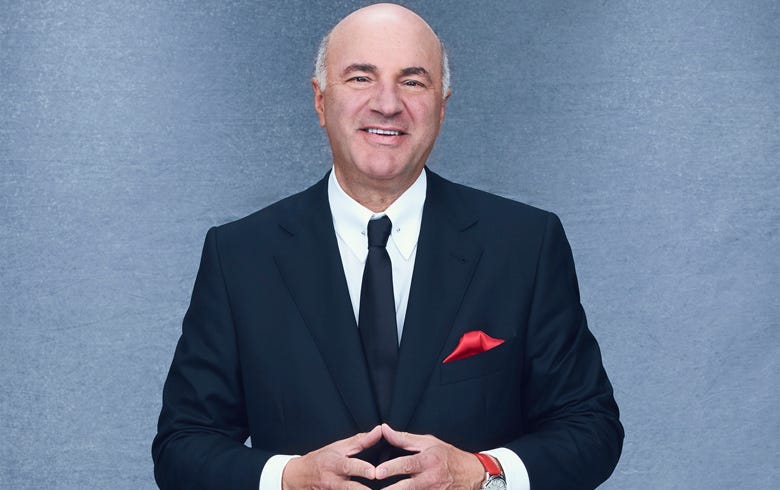
Photo Credit: ABC Kevin O’Leary’s success story starts where most entrepreneurs begin: with a big idea and zero cash.
Kevin O’Leary was born to a middle class family in 1954. The combination of Kevin’s mother’s family heritage as merchants and his father’s Irish charisma truly meant that O’Leary was born for business. Kevin learned most of his business intuition from his mother. She taught him key business and financial insights from an early age. These became Kevin’s core philosophies, and the pillars upon which he would one day build his empire.
Kevin’s approach to business went through major changes as a teenager. During his second day on the job at a local ice cream shop, his boss came into the front of the store where Kevin was scooping ice cream. She looked at Kevin and asked him to scrape all the gum between the Mexican tiles on the floor. Kevin refused and he was fired. That was the moment he realized he never wanted to work for someone else again and charted his path into entrepreneurship as a high school student.
As a university student, Kevin’s innate business sense led him along several different paths – including some very unusual, very entrepreneurial ways of making a profit.
Not long after he finished his MBA, Kevin had a meeting that changed his life forever.
He met a man who had a strange idea for a software product – an idea with huge, high-profit potential that Kevin immediately recognized.After years of ups, downs, sacrifices, challenges, and lessons learned — not to mention a critical phone call that nearly cost him everything — the opportunity that Kevin saw eventually turned into a computer software giant that was acquired for more than $4 billion dollars.
After his extraordinary success at the software company, he founded – and a difficult period of obstacles and legal disputes – Kevin eventually found himself on television, quickly becoming a sought-after host and personality on a range of shows – including Discovery’s Project Earth, CBC’s Dragons’ Den, and ABC’s Shark Tank.
Kevin has since launched O’Leary Funds, an investment fund company; O’Leary Fine Wines; and a best-selling book series on financial literacy.
In 2014, Kevin founded O’Leary Financial Group – a group of brands and services that share Kevin’s guiding principles of honesty, directness, convenience, and above all, great value.
-
Hungerthon 2020: ‘This is a crisis of epic proportions’
Post Views: 911It is estimated that almost 2 million New York City residents, or approximately one in four people, will face hunger this year.
In a normal year, New York City would see over 25 million visits to soup kitchens and food pantries by individuals and families to meet their basic human need for food. That number may triple because of the pandemic this year.
Noreen Springstead, the executive director of WhyHunger, a not for profit NYC-based organization working to end hunger and poverty, says we’re facing a crisis “of epic proportions.”
In an interview with WCBS 880 preparing for this year’s Hungerthon radio fundraiser Springstead said, “I think the pandemic has been illuminating to just how close people were living to the edge of being on a food line.”
Each year for the past four decades WhyHunger harnesses the power of local radio stations like WCBS Newsradio 880 to raise funds for their efforts and raise awareness to the fight against hunger and poverty.
Springstead, a guest on this week’s 880 In Depth podcast said, “Our work is more important than ever because the human need has increased dramatically.”
Springstead joined WhyHunger partner Dr. Melony Samuels from The Campaign to Fight Hunger in New York City, a Bed-Stuy, Brooklyn-based food pantry that has been on the front lines for more than two decades.
Dr. Samuels says her organization has seen a 75% increase in people coming to seek help this year because of the pandemic. In the first three months of the COVID-19 crisis they were literally running out of nutritious food to hand out to people in need.
“It had gotten to a panic stage” and Dr. Samuels says these next few months could be just as difficult.
“January, February, and March when no one thinks about hunger, that’s when it really hits,” Dr. Samuels said.
Springstead says, “These are Great Depression era soup lines, bread lines, food lines. We haven’t seen a hunger crisis like this.”
Hungerthon is a chance for New Yorkers or anyone across the WCBS 880 listening area to pitch in and contribute to this cause. WhyHunger partners with various organizations to present one-of-a-kind auction items that people can bid on with the proceeds going to WhyHunger.
All auction items can be found at Hungerthon.org.
WCBS 880 has our own list of experiences that we are offering this year like video meet and greets with various members of the staff including Wayne Cabot, Tom Kaminski, Joe Connolly, Craig Allen and Lynda Lopez. All of the 880 items can be found at Hungerthon.org/WCBS880.
One of the items we are also promoting is a virtual concert with Tom Chapin, the brother of WhyHunger founder Harry Chapin.
In an interview with WCBS 880 for Hungerthon, Tom Chapin told our Wayne Cabot and Tom Kaminski that this year is most important to help.
“We’re all facing this incredible pandemic now and its’ even worse right now,” he said.
The pandemic came in a year where WhyHunger and the Chapin family celebrated the release of a documentary about the life and work of Harry Chapin called “Harry Chapin: When In Doubt, Do Something.”
Tom Chapin told WCBS 880, “Think about it. He died in 1981, that’s 39 years ago and we’re still talking about him and these organizations, WhyHunger and Long Island Cares.”
Chapin said “it’s other people who have taken up the banner” after Harry’s death “and that’s exactly what we are doing today” with Hungerthon.
“There’s a way you can help, you don’t have to be Harry Chapin” but Hungerthon gives you a chance to “fill your shoes a little fuller and help those around you” as Harry used to do.
For more information visit Hungerthon.org.
-
Retailers Find Pandemic Success In Livestreaming E-Commerce
In Best Of, Entertainment, Featured, Guest, Interview, Latest, News Stories, Technology, The World, Top NewsPost Views: 825By Neil A. Carousso
NEW YORK (WCBS 880) — Livestreaming e-commerce is the new hot trend that is changing the way retailers sell now and it’s leading to profitability for some business owners who had been struggling to survive.
“They can sort of take consumers inside their brand,” said NTWRK president Moksha Fitzgibbons on the WCBS Small Business Spotlight, sponsored by BNB Bank.
He told Joe Connolly and Neil A. Carousso that his video app became a marketplace for retailers small and large to become what “Shark Tank” investor and FUBU founder Daymond John called a virtual “events space” on WCBS 880.
“NTWRK became, really emerged, as that place that consumers can go every day to be entertained, to be educated and get access to that highly desired product,” Fitzgibbons said.
The startup doubled its sales from March to April and he expects growth of 600-700 percent year-over-year after seeing the value of connecting brands with willing buyers that purchase products on the NTWRK app as they watch and interact with owners and influencers live.
NTWRK was founded in 2018. Fitzgibbons joined the company in October 2019 after a couple stints at Complex Networks where he served as chief revenue officer before moving to Valence Media as CRO where he played an integral role in the merger of Media Rights Capital, Dick Clark Productions, The Hollywood Reporter and Billboard.
“Millennials have the most wealth of any generation before them, they aren’t embracing more expensive responsibilities like home ownership and things of that nature, so they’re spending on consumer products, and we’re connecting with them in a medium that’s endemic to them,” said Fitzgibbons.
It’s not only a pandemic pivot, but also a way to grow a retail business – an industry that’s been battered by the growing convenience of e-commerce, the health crisis and recession.
Fitzgibbons, who will lend his expertise to business owners of various industries on the WCBS BNB Bank Virtual Business Breakfast on Thursday, October 15, told Connolly and Carousso about how one Manhattan designer, Jeff Staple, has benefited from using NTWRK the past six months.
“What we offer him is an opportunity for him to reach a massive audience outside of New York City, which is his core, and introduce the brand to new consumers and ultimately drive new revenues for him,” he said.
This speaks to customer behavior over the past decade that’s been accelerated by the coronavirus pandemic and its related retail shutdowns. Fitzgibbons told WCBS 880 he saw engagement with younger customers, who are willing to spend, increase since March. He believes that could be credited to how customers have been trained subconsciously to buy necessities on e-commerce websites like Amazon for convenience rather than go to the store.
“The same will be true with NTWRK, although, we will be curated and have a point of view and sort of be that Barneys/Dover Street-type of experience for this demographic,” he said.
Business owners are encouraged to make their own video content out of their home or store, but NTWRK also offers a video production team and a studio where they collaborate with social media influencers and celebrities to endorse products on a livestream that is watched by prospective customers whom the video app service finds for the retailer.
Moksha Fitzgibbons will share how any business owner can earn a substantial return on investment through livestream e-commerce at the WCBS BNB Bank Virtual Business Breakfast on Thursday, October 15 at 9 AM. Share your questions for Moksha, Joe Connolly and the panel by leaving a message on our listener line at (877) 987-WCBS, and follow the prompts, and we may use your question during the event.
-
Barbara Corcoran Told Her ‘Shark Tank’ Companies To Reinvent To Survive
In Best Of, Entertainment, Featured, Guest, Interview, Latest, News Stories, The World, Top News, videosPost Views: 739By Neil A. Carousso
NEW YORK(WCBS 880) — Real estate mogul Barbara Corcoran says 80 percent of the businesses she has invested in on “Shark Tank” will not survive the economic crisis caused by the coronavirus pandemic.
“The minute this problem started, I said, ‘Sit down and make a list of where every piece of your business comes from, and then, make, right next to it, a list of how you can replace it cause it ain’t going to be there anymore,'” Corcoran told Joe Connolly and Neil A. Carousso of her conversations with the owners of the roughly 80 businesses she bought stake in on the hit ABC reality television program.
Corcoran said on the WCBS Small Business Spotlight, sponsored by BNB Bank, that only a few owners took her seriously when she told them to incorporate a tight team of workers into making decisions on reinventing themselves. Those that did “hit the floor running.”
She said business owners who are persistent and tenacious in their approach are the “warriors” who will survive the recession. She also emphasized communication with customers while working to actively sell current and new products and services.
“I’ve never seen a new business survive if it’s not led by a salesman,” Corcoran said, adding, “If you can’t sell your way out of a pickle, you don’t have a chance.”
She said if an entrepreneur can demonstrate he or she is a master of selling themselves and their business on “Shark Tank,” she’ll “buy anything.”
But, Barbara explained that getting on the show is not a true test of success even though it’s an arduous vetting process.
“When I’m in business with someone three months, maybe four months the most, it’s when the crap hits the fan, what do they do about it? The minute they start blaming somebody else, I know they’re a victim, they’re never going to make it,” she said.
On the flip side, Corcoran told Connolly and Carousso that those owners who take responsibility and actively look for solutions, are the successful business leaders with whom she is making profits.
She also told WCBS 880 that the model for a successful entrepreneur is their track record as a person. Overcoming failure and obstacles in life is an indication to Corcoran that she should invest in the person’s business.
“When I can spot somebody who’s been injured with something to prove, they get a burn in their chest that’s going to make them succeed if they’re hard workers,” she remarked. “I’m looking for that hustler.”
Meanwhile, with tens of millions of Americans unemployed amid the COVID-19 outbreak and business shutdowns, Corcoran is seeing a sizable shift in the real estate market with people fleeing the City for suburbs in New Jersey and Connecticut. The Corcoran Group owner says employers see their employees working efficiently at home and will cut unnecessary brick and mortar costs. U.S. office vacancy will rise from 16.8 percent to 19.4 percent by year’s end, according to Moody’s Analytics REIS estimates. Corcoran sees that as good news for tenants who have taken negotiating power from landlords.
https://www.facebook.com/NeilACarousso/videos/705347700029920/
“The value per foot has got to drop substantially for the landlord to attract tenants and he’s going to have to become a salesman,” she said.
But, Barbara is bullish on the Big Apple.
“I have such confidence in the City. I have no doubt that the City will chug like it always does. We’re just going to hesitate and push forward,” Corcoran, who has lived in New York since she was 22 years old, said, punctuating, “I think it may recover faster than we think.”
She remembers seeing how the country rallied around New York City after the September 11, 2001 terrorist attacks and the “love” Americans displayed while embracing their fellow countrymen and women. She recalled she told her Corcoran Group sales team the real estate market would get “hot within 6 months” and it did with a new crop of buyers.
“I had that deep faith that the City always recovers,” said Corcoran.
Hear innovative and actionable ideas from Barbara Corcoran for business survival with examples from “Shark Tank” on the WCBS Small Business Spotlight Podcast on the RADIO.COM app or on the media player above.
Entertainment
Social Feeds

VIDEO: Told the airline to book us on the next flight out (SPONTANEOUS TRIP!)

VIDEO: The Taylor Swift Effect | WCBS Business Breakfast

VIDEO: Future of NYC | WCBS Business Breakfast

VIDEO: Reasons for New Yorkers to be Optimistic | WCBS Business Breakfast

VIDEO: NYC's AI Chatbot | WCBS Business Breakfast


